🇵🇱 POLSKI
Dawid’s Life in Malaysia

Table of Contents
Introduction
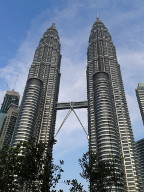 Petronas Towers
Petronas TowersAs you might know already I decided to change something in my life and I decided to go to work in a completely different place and in a completely different role. I had a chance to spend 7 years in Canada in a fantastic job. In the meantime, it turned out that my employer had opened a local branch in Wrocław, hence I could relocate to Poland. Working for almost 9 years in the same position I felt like I became too used to it and somewhat dormant. Of course, I really valued this job, so I didn’t quit but I just limited my work there to my own time possibilities. I am grateful to my supervisors – Robert in particular – that they let me go for such an adventure. At the same time, I took an opportunity to work right in the capital of Malaysia. 2 years earlier, while I was still in Edmonton, I had passed a three-level interview process for a company in that country. I had rejected the offer, though, because I really wanted to return to my homeland. At the beginning of this year, however, the very same company from Kuala Lumpur contacted me and asked me whether I would be interested in working for them. This time I did not contemplate it for long. With a friend of mine I flew to Sri Lanka on a trip to check out the subequatorial climate and after returning from it I decided to do it!
Blog
Date of article: 2017-05-07. Last revised: 2017-06-20.
Departure from Poland and arrival to Malaysia
On Sunday, 29 April I took off from Katowice for a new adventure. From Frankfurt to Singapore for the first time in my life I flew on the largest passenger plane in the world, i.e. Airbus A380. Later I was surprised by the fact that the short 40-minute flight from Singapore to Kuala Lumpur was operated by a very large Airbus A330. Upon arrival at my final destination I had to wait more than an hour in an enormous queue for immigration. Later I paid in advance for a taxi at the airport with a credit card. The approx. 50 km to the city in the late evening took around 1 hour. The driver was a Malaysian Indian. He was complaining that there was racial discrimination in the country. From the outside Malaysia might seem like a multicultural country in which Malay (Muslims), Malaysian Chinese (Buddhists) and Malaysian Indians live in peace and harmony, but the reality is different. He said that Malays had the priority when it came to accessing the universities or government jobs. The second favoured ethnic group was the Malaysian Chinese. The least favoured ethnic group was the Malaysian Indian, therefore they had a tough life so they had to work really hard, since they couldn’t count on the government for any help.
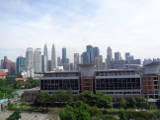 View at Kuala Lumpur City Centre from my balcony
View at Kuala Lumpur City Centre from my balconyAt around 2300 hours I arrived at the apartment complex, in which there was a flat waiting for me. Its owner, James, had been already waiting for me in front of the building before my cab pulled over. James kindly greeted me. He took me first to the 6th floor to show me a swimming pool and a gym for the tenants. I was surprised and at the same time happy that I would be able to run on the treadmill in an air-conditioned room in such a hot climate. Later we rode the lift to the 9th floor to my brand-new place. I was once again surprised. The flat was the right size for me, it was clean, modern and had a balcony with a fantastic view of downtown with its famous Petronas Towers. James told me a lot of interesting stuff and gave me some useful hints about Malaysia. He himself is a very smart Chinese man, who invests quite a lot in real estate. Because of the time difference I was not tired at all and I went to sleep around 0200 hours.
1 May – International Labour Day
International Labour Day fell on a Monday, so I had a whole day to myself. No earlier than before 1300 hours I left the apartment and headed for a long walk around the city centre. It was really hot and humid. After walking, maybe a kilometre or so, I was caught by a downpour. My tiny European umbrella gave way to that wall of rain which suddenly descended from the sky. Streets soon turned into torrents. My sneakers got totally soaked, but I didn’t give up and I continued to walk. After around an hour the rain stopped. In the meantime, I found an Indian restaurant and I had dinner there. I overpaid, but I didn’t know what were the regular prices yet and I was both hungry and I really wanted to hide from the rain.
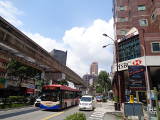 Downtown Kuala Lumpur
Downtown Kuala LumpurMy walk that day was quite substantial. I made at least 10 km and I saw the main highlights of Kuala Lumpur. The city is thankfully – despite its high population – quite compact.
In the evening, I contacted my new supervisor and I asked him what time I should arrive at work the following day. His answer surprised me. He said, “be there at 10 o’clock, that’s when I usually get there”.
First day at work
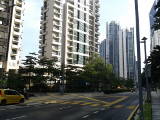 On the way to work
On the way to workIn formal attire, on a burning hot day, I went to the office so that I could be there at 10 o’clock sharp. The walk from my new flat took me 20 minutes. The company has its headquarters on the 15th floor of a high-rise building located just 300 metres from the famous twin towers, so right in the business city centre.
Mary, the secretary welcomed me and walked me around the office. She greeted me with all the employees who were already in the office that morning. There are roughly 80 people working in that office, so I was not able to memorise all the names of my new colleagues. The company is multicultural and multinational. I was greeted very cordially by all. I was assigned a space in the system administrators’ room. My team consists of just a few people, i.e. Ali (my supervisor, originally from Syria), Fadhle (Yemeni), Alfred (from Indonesia) and Kok June (local Malaysian Chinese). My boss Edwin, is a tall – of course – Dutch guy. I was received very well by the team. At 1300 hours Gani, an Indian guy came and took me for lunch to an Indian restaurant.
My first day at work was very interesting for two reasons: first is that for
half a year the coffee machine had been broken and there hadn’t been any decent
coffee (only the so-so Malaysian instant coffee). Just that very day a service
guy showed up and installed a brand new professional Swiss coffee machine!
All coffee drinkers were very happy about that.
The second is that that
day there was a very serious failure of one of the servers in the Netherlands.
My team had to fix it as soon as possible, because every minute of
downtime is lost revenue for the company. The last time a failure with a similar
magnitude had happened was more than 3 years ago. The boys were
fighting really hard, but there were constantly new problems arising.
Stress and pressure could be felt in one's guts. Despite my lack of knowledge
of those systems I also decided to take part in the rescue operation.
We fixed the issue at around 10 o’clock at night. I was told that I didn’t
need to stay that long at work but I decided to stay anyway. On that first day,
I learned way more than I normally would have in 2 months.
Everyday work
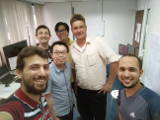 SysAdmins Team
SysAdmins TeamThe following days were quiet with 8 hours of work time. Every day we would go out for a one hour lunch. It is not a paid time so when, for instance someone arrives at work at 10, then he should finish work at 7 o'clock unless he didn’t take a lunch break or a shorter one. Some people arrive at work no sooner than at 10:30, sometimes even at 11:00, which is interesting. The first people to arrive at the office, including myself, show up at 9.
It haven't been many days since I arrived, but I think I have already blended in
with the team. We have a nice atmosphere. I was surprised by one particular thing.
On Fridays, the company buys everyone a beer and we can drink it during work time.
We have many non-drinkers (e.g. Muslims), so they give their share to the ones who
can and like to drink.
One more thing regarding the Muslims. When the time comes for a prayer (5 times a day),
they put their little carpets on the floor, take their shoes off and start to pray discretely (individually).
The prayer lasts only a couple of minutes but it is an interesting
phenomenon to observe, nonetheless.
I think that from my new colleagues I will get to know many interesting things
about different customs and religions. On Friday, for example, I got to
know what it means when a restaurant or food has been halal certificated.
I had never though about it before.
Observations from my first week
The city
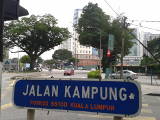 My postal code is exactly the same one as of Trzebnica
My postal code is exactly the same one as of TrzebnicaKuala Lumpur is clean and well maintained, especially the super modern downtown area.
Traffic jams in the peak hours are just terrible. Sometimes even at 8 PM I can
see from my balcony, that the traffic on Jalan Tun Razak street is not moving.
The public buses in the city centre are free (colour “GOKL” lines).
There is a left-hand traffic system used here and I keep forgetting about walking
on the left side of the sidewalk.
An interesting coincidence: the postal code of the area I live in is 55100.
Trzebnica, the Polish town I used to live in, has a 55-100 postal code!
People
People are nice and friendly. Most of them know the English language. Indian and Chinese people also can speak in Malay as it is a mandatory language taught at schools.
Food
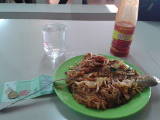 €1 Dinner
€1 DinnerIncredible and cheap! Every culture has a different cuisine, so there are many options to choose from. Local restaurants are cheap and it is not worth cooking for yourself at home. For example: yesterday (on Saturday) for a filling lunch I paid 4.5 ringgit, which is around €1! I don’t know if I will be able to find anything cheaper than that price but in general prices in food courts in downtown do not exceed 10 ringgits (slightly more than €2).
Prices
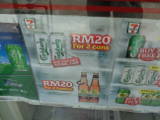 2 beers in a promotion at 7-Eleven for about €5
2 beers in a promotion at 7-Eleven for about €5However, the prices in supermarkets are more expensive,
sometimes significantly more, than in Poland. Being here one realises how cheap
the food is in Poland in supermarkets or discount stores. I only found tomatoes to
be cheaper here, but for example: UHT milk is almost 3 times more expensive
(evaporated milk is more common here), a small slice of cheese costs around €7!
For 6 apples I paid €2.5.
What is cheap in Malaysia? Services are cheap. A perfect example is mentioned
earlier regarding the prices in restaurants. Haircuts for men cost 10 ringgits (€2).
Petrol is very cheap (slightly less than €0.5/L).
Freedom
There is a freedom of religion and a democratic system. However, Muslims cannot legally purchase alcohol. Alcohol is highly taxed (so called “sin tax”; third highest in the world after Norway and Singapore), which causes the price of beer in supermarket to be over €2.5. A bottle of wine is minimally €20! I remind you that in Polish discount stores one can buy a decent wine for consumption for €2.5!
The Internet is censored. Eg. porn websites are blocked.
Date of article: 2017-05-28. Last revised: 2017-06-20.
On Saturday, the 27th of May, Ramadan or the holy fasting began. On the way from my weekly grocery shopping I immediately noticed one thing: most of the smaller restaurants were closed. This included also private people selling food straight from their houses. Malay – Islam believers – from sunrise to sunset have a strict fast. During that time, they can neither eat nor drink. Despite Malay food providers everything else in the city runs normally.
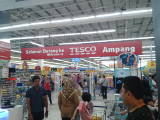 Overcrowded supermarket
Overcrowded supermarketToday at the Tesco supermarket there were huge crowds of folks, unseen to me before! Apparently, shopping helps to forget about the fast. At 1400 hours I couldn't get any meat. Everything had been sold out! A shop assistant told me to come again the next morning. Well, I guess I won't be cooking spaghetti with beef for dinner today.
On the way back, however, I stumbled upon a bazaar with... variety of prepared foods! Those so-called Ramadan Bazaars appear on the streets during the fasting season and their purpose is to sell cooked meals to be consumed at home after the sunset. The selection of foods was humongous and the aromas in the air were fantastic. The items ranged from murtabaks (stuffed pancakes with minced meat), to fried noodles and rice, to seafood, to cakes and baked goodies.
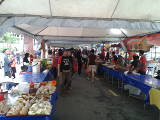 Ramadan (Food) Bazaar
Ramadan (Food) BazaarI bought and relished a few things as they were delicious. When I was eating
a sweet pancake, I was approached by a Chinese man who gave me advice not
to eat in front of all those people, as that can irritate them.
I did what he said and kept relishing the food on the nearby street.
I really admire the tenacity of those people, who prepare all
these foods and are surrounded by the aromas of them, most of the time in a
swelter. For the next 30 days...
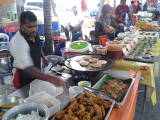 Lempeng sweet pancakes, very oily, yet delicious!
Lempeng sweet pancakes, very oily, yet delicious!I listen to Traxx FM, a local English language pop music radio station. There are announcements about the exact times of sunsets for various Malaysian cities. The big feast is about to start in Kuala Lumpur at 1919 hours in Malay homes and in restaurants. The latter ones open their doors in the evening and are packed with people. Some of them even offer Ramadan buffet options. It's a good idea to make a reservation in advance. Additionally, the streets get flooded with food hawkers. Some of them sell items straight from the car trunks.
What a great time it is to try some new flavours!
Date of article: 2017-06-07. Last revised: 2017-06-20.
Just one week after my arrival to Malaysia, James – the owner of the condo, in which I live – invited me for a dinner. He came to pick me up with his daughter Melissa and his son Dougles and his girlfriend Yi-Bei. We drove for dinner to a restaurant. James selected the Sek Yuen restaurant. It is one of the oldest Chinese eateries in Kuala Lumpur. The restaurant is large enough to occupy space in two adjacent buildings. When we arrived, both places were full and we had to wait for at least a couple of minutes for our seats.
 Dinner with James and his family
Dinner with James and his familyOur table was a rotating one, which is typical in Chinese restaurants. James
ordered 3 different dishes and a local dessert. Each of us got a plate and
chopsticks. The dishes were brought in stages and placed in the centre of the
table. From there we were taking in the food onto our individual plates. It is
quite common for Chinese people to order many dishes which are later shared
among family members. In this way when eating out at a restaurant, one can try
more dishes than when ordered individually.
One of the ordered dishes was a roasted duck – the speciality of the house.
Although I am not a huge fan of ducks but that particular one was so fantastically
prepared that it was simply delicious.
We spent almost 3 hours enjoying food and talking. Unbelievable how time flew by.
One week ago on Sunday James invited me for lunch to a different popular Chinese restaurant. A queue to enter the Yut Kee was fairly long. We were seated at the table after around 30 minutes of waiting. Still, we got inside relatively quickly as there were only two of us.
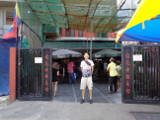 Queue for Yut Kee restaurant
Queue for Yut Kee restaurant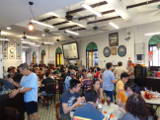 Restaurant was full
Restaurant was full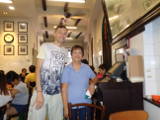 Third generation family business
Third generation family businessJames recommended the pork chop and he order some fried noodles, actually two kinds of noodles (thick and thin) with various additions such as squid. Both dishes were very tasty, especially the fried noodles as I hadn't eaten it before. James also suggested that I order half boiled eggs, which is a Malaysian delicacy. I declined, because I was not really convinced and I worried about food poisoning. He ordered such eggs and gave me a sample to try. I was surprised in a good way. I liked them. James told me that those eggs were fresh and high quality, as that's a must in order to prepare such dish.
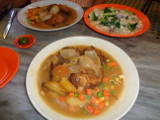 Chinese pork chop and fried noodles
Chinese pork chop and fried noodles James with his order
James with his order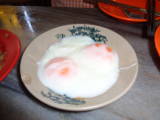 Half boiled eggs
Half boiled eggsFor drinks I ordered Chinese coffee with milk, with no sugar, so called kopi-C kosong. It is a must-try coffee! It is served in a rather small cup and has a fairly thick consistency. Evaporated milk is used as one of its ingredients, which is very common here. I started to like this kind of coffee and since that time I have ordered such drink in other joints in Kuala Lumpur as well.
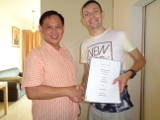 Tenancy agreement signed!
Tenancy agreement signed!After a very tasty dinner I was dropped off at my flat, where I signed a tenancy agreement for a period of one year. Earlier I was able to negotiate good conditions for both parties and I was happy that my landlord is a very good person whom I was able to get to know in nice circumstances.
Thank you James!
Date of article: 2017-07-11. Last revised: 2017-10-16.
That time came when my hair grew long enough so it started to annoy me and I had to do something about that. Unfortunately Patrycja's hair salon is 9300 km away from here, so I decided to look for a local alternative.
While walking to do my shopping I spotted a few hair studios in a typical residential neighbourhood, so for the regular local folks. I decided to go to the barbershop. When I entered the place there was one man sitting inside. He told me that he was waiting for a haircut, but the barber had gone for lunch and he was supposed to come back soon. I thought: that's interesting, the guy had left the place without even bothering to close the shop. The hair salon was small, narrow and not too visually attractive. After a couple minutes, actually two barbers returned, that is an older boss and younger employee. Both men had emigrated from India. The boss took care of me.
I didn't have any problems with choosing a hairstyle as on the wall there were hanging photos of popular hairstyles with assigned numbers. I chose one and the master started his work. At the beginning it was as usual: scissors and electric hair clipper. Later, however, when the barber pulled out a new blade and attached it to a straight razor, I started to worry. I had never had my hair cut using such a razor before. The boss cut the hair on my neck with it. It turned out that the whole stress was unnecessary as he was a very experienced man.
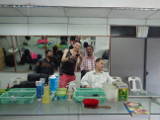 Excellent job
Excellent jobAfter the haircut was done the barber suddenly grabbed my head and twisted it hard very rapidly. It looked like in the movies, when they twist the neck in order to kill someone. The second barber, upon seeing my surprise, told me that it was an Indian head massage. At the very end the boss gelled my hair.
For that service I was asked to pay... 10 ringgits, which is just about €2 or $3 CAD! My next visit to a Hindu barber will definitely be very soon.
At the end I'd like to mention one thing that I really liked in that shop: On the opposite wall there was a large, slightly tilted, mirror installed, at which one could always look to see what the barber is doing with the back of one's head.
Date of article: 2017-08-19. Last revised: 2017-10-16.
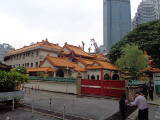 Buddhist temple in Kuala Lumpur's business district
Buddhist temple in Kuala Lumpur's business districtJust beside the office tower where I work, really close to the famous twin towers, at Jalan Ampang street there is a really nice looking Buddhist temple named Dharma Realm Guan Yin Sagely (法界观音圣寺).
The temple was like a typical temple, but behind it still on its premises there is a canteen, which is very popular during lunchtime. I would never think that a temple can also provide those kind of services and most likely I would have lived in oblivion about that interesting place if not for my colleagues who regularly come here for lunch (some of them every day).
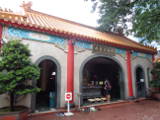 Entrance to Dharma Realm Guan Yin Sagely temple
Entrance to Dharma Realm Guan Yin Sagely templeIt is not a typical restaurant, though, but rather a self-serve canteen. Upon entrance, first you stand in a queue to get to the food. At the beginning, just next to a pile of clean dishes, there is a big pot of rice. You can take as much rice as you want. Next, you get to a table where there are various vegetarian foods, from simple vegetables, to tofu based items, to more "advanced" dishes such as fried noodles, spring rolls etc. The choice is surprisingly large, despite the lack of meat and dairy products.
My favourite dish, which I really like, are the tempeh squares, obtained from soi seeds, which are made by a fermentation process. Not everyone likes tempeh (more on encyclopedia), however I am always disappointed when it is unavailable (there were situations when it was not available for 2 weeks in the canteen).
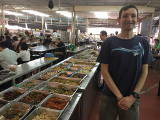 The choice of vegetarian foods is huge
The choice of vegetarian foods is hugeSimilar to all-you-can-eat buffets, you choose and pick your own food. Then you can visit additional stands with drinks, baked pastries or Chinese soups. At the end you arrive at a till where a lady gives you utensils and assesses the cost of food on your place. That assessment is a big mystery, however, because nowhere is a price roster of particular foods (except for aforementioned additional stands).
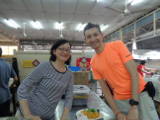 Contented customer of Buddhist canteen
Contented customer of Buddhist canteenMy beginnings at this place were interesting but also irritating, because
sometimes my lunch would be assessed at 4 ringgits (€0.8 or $1.2 CAD) and
sometimes at 12 ringgits (€2.4 or $3.6 CAD)! With each new visit I am slowly
getting to know how this system works. That is, for some items you pay per
pieces and for the others the quantity doesn't matter, you just pay for the
fact that you picked that particular item. To the former group, for example,
belongs tofu squares, and to the latter one, belongs fried potatoes, for
example.
Nevertheless, the human factor causes that for the same lunch I pay a
random price each visit, however the price deviations are low.
After the food payment you can finally take a seat at one of many common tables, however you will need to find an empty spot. Sometimes there are so many people, that you will need to do a thorough search and even walk from one side of the hall to the other. Next to the eating tables there are big pots, in which there are vegetarian soups (usually two kinds) and tea. And those are free!
Upon having a delicious lunch, you take your plate and do a little waste segregation, i.e. uneaten food, dish, soup bowl and utensils are thrown into different containers. Next to them there is a sign reminding people that food is a blessing and shouldn't be wasted.
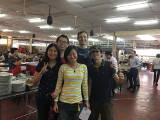 Friends from work thanks to whom I discovered that place
Friends from work thanks to whom I discovered that placeMostly elderly people work at the canteen. Some of them are employed and get paid. The rest are volunteers who work for free due to their good will. Instead of staying at home and passively watching TV, these people prefer to come to work and serve others! The profit from the canteen operations goes to temple maintance, employees' salaries and to charity.
I heard from friends that during Buddhists holidays the food is absolutely free! It is recommended (but not required), though, to donate for charity.
Isn't it a wonderful idea to follow in Poland? There are so many churches located in some really attractive neighbourhoods in cities. If they established similar canteens, not necessarily vegetarian, they would certainly attract customers looking for inexpensive and tasty foods, yet they would create new jobs for pensioners or the unemployed, for example, not to mention that it would generate extra revenue...
Date of article: 2018-03-18. Last revised: 2018-04-28.
When I started living in Kuala Lumpur, it was so hot for me here that of course, like everyone else, I used air conditioning intensively in my apartment. The air conditioner is a heavy power consuming device, so my monthly electricity bill was around 100 MYR. I must point out here that I was switching off the A/C unit during working hours and at night so as not to freeze.
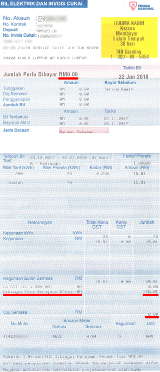 Power bill
Power billAs time went by, I wondered why people at work were constantly sick and cold, despite such a warm tropical climate. I was also a victim of the illness myself and wondered how this could be done. I thought this could be due to the use of air conditioning, which exposes the human body to high temperature and humidity fluctuations.
I decided to limit the use of air-conditioning at home until I finally gave it up completely. Someone might think that it is a pure madness, but my body has adapted itself to sleeping at temperatures of around 30°C. I've also learned to take cold showers that cool my body down well after waking up and before going to bed.
The experiment has brought a great result: since I gave up air conditioning at home, I have not been sick or cold a single time!
What a surprise I had when I got my first electricity bill after launching my experiment. Of course I expected a smaller amount, but it turned out that I had to pay zero ringgits! As the bills come in Malaysian, my colleague explained to me that the government of that country gives a subsidy for electricity when the bill does not exceed 20 MYR. Indeed, I have found information about it on the website of the Tenaga Nasional electricity provider. At a cost of 0.218 MYR per kilowatt hour, this means that in Malaysia up to 91 kWh of energy consumed per month is sponsored by the state!
My resignation from the A/C in my flat brought measurable benefits. Firstly, for more than six months I have not paid for the electricity a single sen (the equivalent of a cent). Secondly, I am healthier and not getting ill. Thirdly and finally, I am contributing in this way to the reduction of greenhouse gas emissions.
Date of article: 2018-05-09.
Today's elections to the Malaysian Parliament are a very important but also strange day. The middle of the week itself was chosen as the election date. For the third time in history, elections are not held here at the weekend. Why does it matter? Unlike Poland and other countries, citizens can only vote in their place of residence. So if someone works in Kuala Lumpur, but is registered in the state of Sabah on Borneo Island, they must go there to vote! Moreover, Malaysian citizens working in Singapore and Thailand cannot vote in their country's embassies and must return to their home country to take part in the elections. Despite these inconveniences, the vast majority of those entitled to vote will take part in the elections because people want to change the corrupt government.
Shortly after setting an election date, which, to put it mildly, people did not like very much, the current authorities announced this day as a public holiday so that the citizens could vote in time. The polling stations are open from 08:00 to 17:00 only.
 Headquarters of MCA party, BN coalition member, on election day
Headquarters of MCA party, BN coalition member, on election dayAt the end of the election campaign, the two main parties fighting for citizens' votes tried to collect as many votes as possible through costly promises. For example, Barisan Nasional (BN), the current party in power for the last 61 years, has promised that if it wins, it will exempt young people from income tax and refund them the tax already paid for the previous fiscal year. In addition, two days were promised as public holidays for the start of Ramadan and free motorway tolls at the end of that period. The opposition party, on the other hand, Pakatan Harapan, has promised that if a majority vote is won, it will announce Thursday and Friday as public holidays.
Soon it will turn out who will win and what the consequences will be.
Your thoughts...

Comment was added by James on 2017-06-21 22:00:09.
Comment was added by Bill on 2017-06-21 05:08:00.
Comment was added by Bill on 2017-06-04 18:54:45.